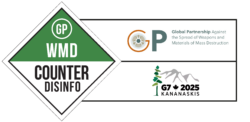Strengthening Global Health Security
International partnerships are essential for bolstering global health security, a key pillar of the Biological Weapons Convention (BWC). Article X of the treaty highlights the importance of scientific cooperation and assistance to share biological knowledge, tools, and best practices, which are crucial in safeguarding states from infectious disease threats.
Over the years, Article X has facilitated partnerships that have built robust health security infrastructures, safeguarded pathogen collections, trained professionals in biosecurity and biosafety, and enhanced global capacities in disease surveillance, detection, and response. Success stories span across the world in places like Brazil, Georgia, Ghana, Guinea, Laos, Malaysia, Senegal, Thailand, and Uganda.
In 2018, a significant partnership between the governments of Ghana and Canada led to the development of modular labs in Accra, Pong Tamale, and Takoradi. Initially aimed at detecting diseases like Anthrax, Avian Influenza, and African Swine Fever in animals, these labs were crucially adapted to provide frontline diagnostics during the COVID-19 pandemic.
Another noteworthy collaboration between Uganda and the United States focused on strengthening biosafety and biosecurity amidst regional instability in East Africa. This multi-year program developed vital infrastructure to safeguard dangerous pathogens and trained a workforce on dual-use research. It also enhanced the capabilities of Public Health Emergency Operations Centers, proving invaluable in times of crisis.
Biosecurity relies on our ability to prevent, detect, and respond to serious biological threats, wherever they may arise. Promoting and reinforcing these crucial partnerships in the biological and medical sciences is vital to ensuring global health security.
